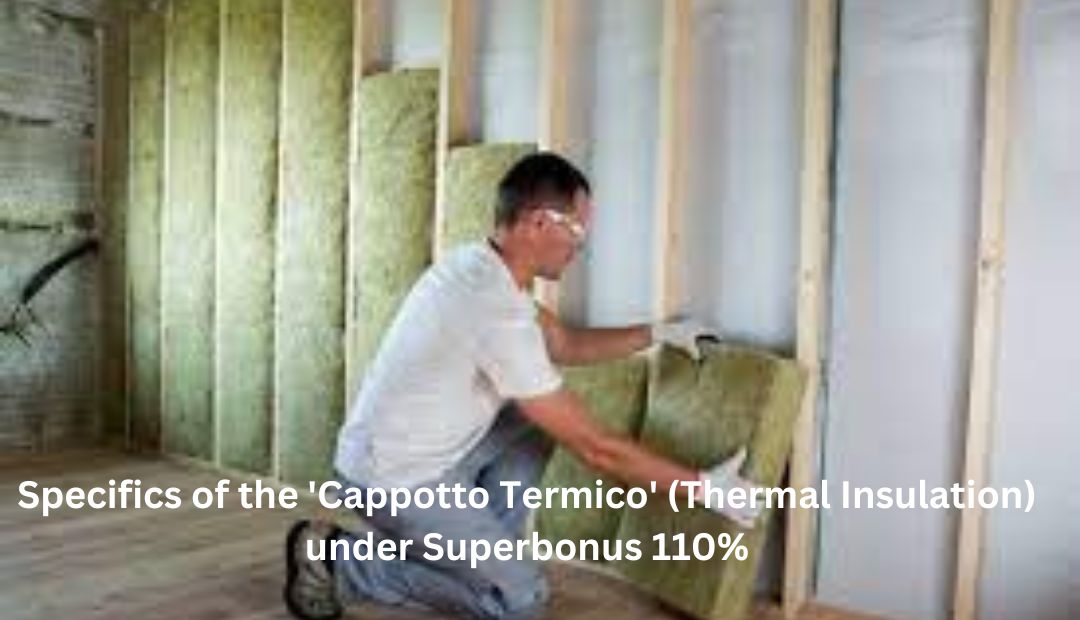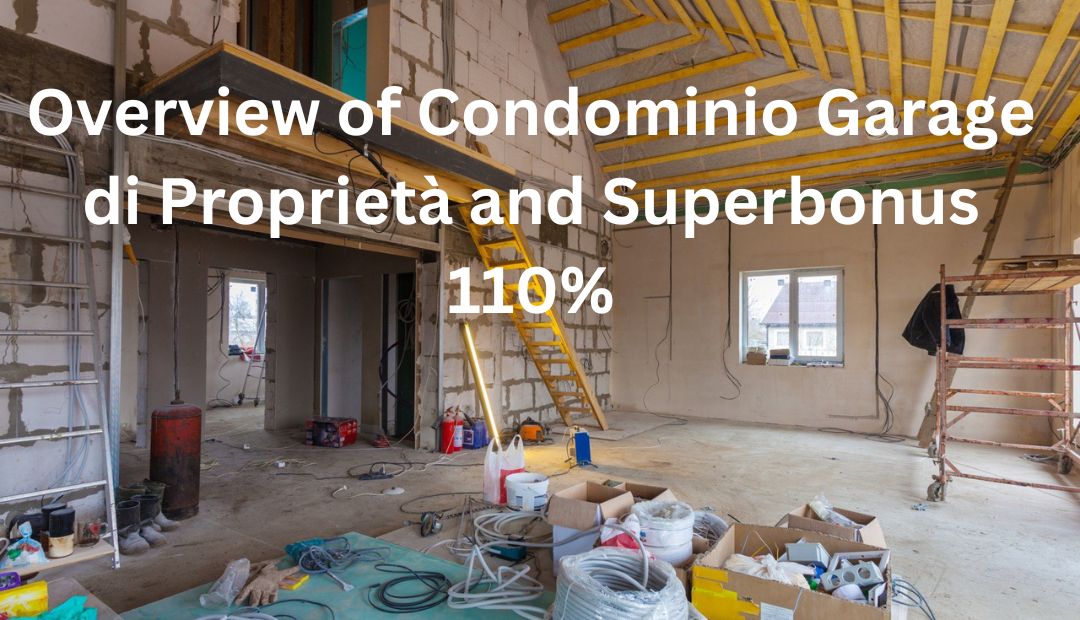The Superbonus 110% initiative introduced by the Italian government offers substantial incentives for energy-efficient upgrades and renovations to residential buildings, but the complexities arise when these renovations involve privately owned garages within condominiums. Understanding the nuances of these regulations is essential for any homeowner or property owner in Italy. This article explores how these legal frameworks impact those seeking to improve their garages, why condominium assemblies may refuse authorization for such works, and what can be done about it.
What condominio garage di proprietà nega autorizzazione cappotto superbonus 110
The Superbonus 110% was designed to stimulate the Italian economy while addressing climate change concerns. Through tax deductions, property owners can reclaim 110% of the expenses involved in energy-efficient renovations, including insulation, solar panel installation, and earthquake-proofing. The program aims to reduce energy consumption in residential buildings, making homes more sustainable and reducing carbon footprints.
Eligible renovations under the scheme include thermal insulation systems, heat pumps, and replacement of windows with more efficient alternatives. While the program primarily focuses on residential properties, garages are not exempt from these benefits if they are part of a larger property improvement plan.
The Role of Energy Efficiency in Superbonus 110%
The driving force behind Superbonus 110% is to promote energy efficiency. The initiative prioritizes upgrades that reduce a building’s energy consumption. The ‘Cappotto Termico,’ or thermal insulation system, plays a pivotal role in this regard, reducing heat loss through walls and thus lowering energy bills. Insulating garages can contribute to a building’s overall energy efficiency, but these upgrades often require approval from the condominium assembly, especially when the garage is privately owned but part of a shared building complex.
Specifics of the ‘Cappotto Termico’ (Thermal Insulation) under Superbonus 110%
The ‘Cappotto Termico,’ a critical part of Superbonus 110%, is an external thermal insulation system that wraps a building in insulating material to prevent heat loss. This system is highly effective for reducing energy consumption, but it requires significant construction work, often leading to disputes within condominiums. For a garage to benefit from this upgrade, the work would need approval from the entire condominium, complicating matters for private garage owners.
Understanding the Condominium Structure in Italy
Condominiums are common in Italy, where shared ownership of common areas—like the roof, staircases, and sometimes garages—can lead to complicated legal dynamics. Each condominium operates under a set of rules agreed upon by all property owners, making collective decision-making essential for any major building renovations. This means that even though a garage is privately owned, its renovations, especially those impacting shared walls or building efficiency, need to be approved by the condominium assembly.
Garage Ownership within a Condominium
Garage ownership in condominiums can be tricky. While an individual may own their garage, its connection to the main building may require permissions for any modifications, particularly if these involve external changes, such as thermal insulation. Condominiums can have specific rules about changes that affect the aesthetic or structure of the entire building, meaning private garage owners often face roadblocks when attempting to make energy-efficient upgrades.
Restrictions on Renovations within Condominium Garages
Italian law regulates how modifications to privately owned sections of condominiums can be made. Even though a garage is privately owned, changes that might affect the building’s common areas—such as adding insulation—often require approval from the condominium assembly. If these rules are not followed, legal disputes can arise, delaying or even halting proposed renovations.

Why Condominiums May Refuse Authorization for Thermal Insulation
There are several reasons why a condominium might refuse authorization for thermal insulation work on a garage. Concerns about maintaining the building’s aesthetic, potential damage to common areas, and the overall cost of the renovations are among the top reasons for refusal. Additionally, some owners may object if they do not directly benefit from the improvements.
Legal Rights of Garage Owners in Condominiums
Garage owners in condominiums have specific legal rights, but they must navigate a complex system of condominium rules. Owners are allowed to make modifications to their property, provided these do not affect common areas or violate condominium regulations. If renovations impact the structure or efficiency of the entire building, approval from the condominium assembly is typically required.
The Role of Condominium Assemblies in Approving Superbonus 110% Works
Condominium assemblies are critical in approving or denying renovations under the Superbonus 110%. Any modification that affects the building’s structure or common areas must be voted on by the condominium owners. For garage owners, this means their ability to install insulation or other energy-efficient upgrades may depend on the outcome of these votes.
Steps to Take if a Condominium Denies Authorization
If a garage owner’s request for thermal insulation under the Superbonus 110% is denied, several steps can be taken. First, they can appeal to the condominium assembly, presenting evidence of how the improvements will benefit the entire building. If this fails, mediation or legal action may be necessary to resolve the dispute.
Legal Recourse for Garage Owners Denied Superbonus 110% Benefits
Garage owners have legal options if their condominium refuses authorization for Superbonus 110% renovations. They can file a complaint with the building administrator or, if necessary, take the matter to court. Italian law provides protections for property owners, but each case must be evaluated based on the specific circumstances.
Government Support and Advice for Navigating Superbonus 110% Regulations
The Italian government offers support for homeowners seeking to take advantage of the Superbonus 110% program. This includes guidance on how to apply for the tax credit, legal resources, and mediation services to help resolve disputes within condominiums.
Case Studies: Successes and Challenges in Implementing Superbonus 110% in Condominiums
There are numerous cases of condominium owners successfully implementing Superbonus 110% renovations, including garages. These case studies highlight the importance of preparation, clear communication with other owners, and the role of legal guidance in overcoming obstacles.
Conclusion: Navigating the Superbonus 110% as a Garage Owner
Garage owners in condominiums face unique challenges when attempting to implement energy-efficient upgrades under the Superbonus 110% program. Understanding the legal framework, working closely with the condominium assembly, and seeking government support are critical steps for successfully navigating these challenges.
Frequently Asked Questions (FAQs)
- What is Superbonus 110% and who qualifies for it?
Superbonus 110% is an Italian government initiative that provides tax credits for energy-efficient building renovations, including garages within condominiums. - Can I apply for Superbonus 110% for my private garage in a condominium?
Yes, but the renovations typically require approval from the condominium assembly, particularly if they affect common areas. - What can I do if the condominium refuses authorization for improvements under Superbonus 110%?
You can appeal to the assembly, seek mediation, or pursue legal action if necessary. - Are there any specific laws that protect garage owners in condominiums?
Yes, Italian property law protects garage owners, but modifications affecting shared areas must follow condominium regulations. - How does the ‘Cappotto Termico’ improve energy efficiency?
The ‘Cappotto Termico’ provides external insulation that reduces heat loss, making buildings more energy-efficient and lowering energy costs. - What is the role of the condominium assembly in approving Superbonus 110% projects?
The assembly must vote on any modifications affecting the building’s common areas or structure, including garage renovations under Superbonus 110%.
